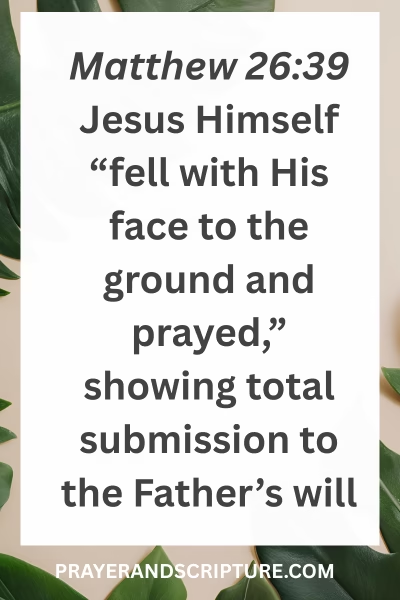Is it wrong to pray in bed? Many of us have experienced those quiet moments, wrapped in the warmth of soft blankets, with a gentle night lamp glowing nearby, whispering prayers before drifting off to sleep. It’s a peaceful and personal time—no need to kneel or find a hard floor, just you, your thoughts, and God. In those moments, it often feels like praying in bed is enough because, after all, prayer is prayer, isn’t it?
But here’s the challenge: while praying in bed might seem harmless or even intimate, it can easily slip into a habit that weakens our spiritual discipline without us realizing it. The enemy of your soul rarely tempts you with obvious sin — sometimes, he lulls you into subtle spiritual laziness. And before you know it, your prayer life is lukewarm.
Is It Wrong to Pray in Bed?
Why does this matter? Because prayer is the oxygen of your spiritual life. If your prayers become shallow, distracted, or rushed, it’s like breathing shallow breaths when you need deep, life-giving oxygen.
Jesus Himself often withdrew to solitary places to pray (Luke 5:16). Notice — He didn’t pray lying down in comfort. He sought intentional places, positions, and moments to engage with the Father. That’s the model we’re called to follow.
This post isn’t about shaming anyone for praying in bed — in fact, there are moments when it can be powerful and necessary. Instead, we’re going to uncover:
When praying in bed is perfectly fine.
The dangers you might not see coming.
Biblical insights on posture and focus in prayer.
Practical steps to deepen your prayer life starting today.
By the time you finish reading, you’ll know exactly how to keep your prayer life burning bright — whether you’re in bed, on your knees, or walking through your day.
The Hidden Dangers of Always Praying in Bed
At first glance, praying in bed feels cozy and harmless — after all, God hears us anywhere. But if we make it our default posture for prayer, certain hidden dangers can quietly creep in and weaken our walk with Him.
1. Distraction Comes Easily
Your bed is designed for comfort and rest, not spiritual warfare. When you’re lying down, your body naturally begins to relax, your mind drifts, and before you know it, you’re replaying your day or planning tomorrow instead of talking to God. Jesus warned in Matthew 26:41, “Watch and pray so that you will not fall into temptation. The spirit is willing, but the flesh is weak.”

2. Sleep Steals Your Focus
How many times have you started praying in bed, only to wake up hours later, realizing you never finished? The enemy doesn’t need to tempt you with sin — he only needs to make you too sleepy to pray effectively.
3. It Can Breed Spiritual Laziness
When we habitually choose the easiest, least engaging posture for prayer, it can subtly train our hearts to give God minimal effort. Over time, this can affect not just prayer, but Bible reading, fasting, and worship.
The danger isn’t in the position itself — it’s in what it does to your spiritual intensity. Intentionality matters in prayer. When we’re deliberate in body and mind, we’re far more likely to be deliberate in spirit.
When Praying in Bed is Perfectly Fine (and Even Powerful)
While it’s true that always praying in bed can foster distraction, there are seasons and situations when it’s not only appropriate but deeply meaningful. The Bible is clear that God is not limited by place, posture, or time — He listens to His children anywhere.
1. When You’re Sick or in Pain
If you’re bedridden due to illness or injury, praying in bed isn’t laziness — it’s necessity. God honors the cry of a suffering heart. In Psalm 34:18, we read, “The Lord is close to the brokenhearted and saves those who are crushed in spirit.”
2. In Moments of Nighttime Reflection
Some of the sweetest prayers happen when the lights are off, the world is quiet, and you’re alone with your thoughts. King David himself said in Psalm 63:6, “On my bed I remember you; I think of you through the watches of the night.” This is not rushed or distracted prayer — it’s intimate, unhurried communion.
3. As a Way to Fall Asleep in God’s Presence
Ending the day whispering prayers until you drift off can be a beautiful act of surrender. It’s not about “failing” to finish your words — it’s about letting His peace be the last thing you experience before sleep.
The key difference is intentionality. There’s a vast contrast between only praying in bed out of convenience and choosing that place in moments when it’s most meaningful.
Biblical Examples of Praying in Different Postures
The Bible is full of moments where God’s people prayed in many different ways — standing, kneeling, lying prostrate, lifting hands, or even praying in bed. This shows us that posture is not a rigid rule but an expression of the heart.
1. Standing in Prayer
In Mark 11:25, Jesus said, “And when you stand praying, if you hold anything against anyone, forgive them, so that your Father in heaven may forgive you your sins.” Standing was a common Jewish posture for prayer, symbolizing readiness before God.
2. Kneeling Before the Lord
Kneeling communicates humility and surrender. In Daniel 6:10, even under threat of death, Daniel “went home to his upstairs room… three times a day he got down on his knees and prayed.”
3. Lying Prostrate in Deep Reverence
Some of the most intense biblical prayers were offered face-down. In Matthew 26:39, Jesus Himself “fell with His face to the ground and prayed,” showing total submission to the Father’s will.

4. Praying on the Bed
Not all biblical prayers happened in public worship or on the temple steps. In Psalm 4:4, David says, “When you are on your beds, search your hearts and be silent.” This is a quiet, contemplative form of prayer, often at night.
From Scripture, we see that God responds to the posture of the heart far more than the posture of the body. Each position serves a purpose — whether it’s strength, surrender, or intimacy.
The Spiritual Risks of Making Bedtime Prayer Your Only Prayer Time
While God hears every sincere prayer — even whispered as your eyes close — limiting prayer to bedtime can quietly weaken your spiritual life.
First, it can foster spiritual laziness. Prayer was never meant to be a quick “day’s summary” before sleep but a constant conversation with God. In 1 Thessalonians 5:17, Paul instructs, “Pray without ceasing.” If we only speak to God when tired and distracted, we risk treating Him as a last thought rather than our first priority.
Second, it reduces prayer to a reactive habit instead of a proactive one. Morning and midday prayers prepare our hearts for challenges ahead; bedtime-only prayer often reviews the damage after the day has already passed. In Mark 1:35, we see Jesus rising “very early in the morning” to pray, setting the tone for His mission.
Finally, bedtime-only prayer can slip into mindless repetition. When exhausted, our words may be hurried or mechanical, lacking the attentive connection God desires. As Jesus warned in Matthew 6:7, “Do not keep on babbling like pagans, for they think they will be heard because of their many words.”
Bedtime prayer should be a jewel in the crown of your prayer life — not the whole crown.
The Importance of Spiritual Alertness in Prayer
Prayer is not just speaking words; it is engaging in a spiritual transaction. To pray effectively, your mind and spirit must be awake, attentive, and present. Jesus Himself emphasized this when He told His disciples in Matthew 26:41, “Watch and pray so that you will not fall into temptation. The spirit is willing, but the flesh is weak.”
When you are spiritually alert, you are sensitive to the Holy Spirit’s whispers. You can discern what to pray, how to pray, and when to pause and listen. Spiritual alertness allows you to notice God’s promptings — maybe to pray for a specific person, to intercede for a pressing issue, or to thank Him for an unexpected blessing.
The enemy often works in distraction and spiritual drowsiness. 1 Peter 5:8 warns, “Be alert and of sober mind. Your enemy the devil prowls around like a roaring lion looking for someone to devour.” A tired, unfocused prayer life leaves openings for discouragement, temptation, and missed opportunities to align with God’s will.
Imagine trying to have an important conversation with a close friend while half-asleep — the connection would be shallow. In the same way, our prayers lose depth when we are not fully engaged.
A spiritually alert prayer life is like a soldier on duty — eyes open, ears tuned, heart ready. It transforms prayer from a sleepy ritual into a powerful spiritual weapon.
Why Fatigue Affects the Depth of Prayer
Fatigue is one of the quietest enemies of effective prayer. It doesn’t always attack with loud distractions; sometimes it simply dulls the sharpness of your spirit. When you are physically or mentally exhausted, your mind struggles to focus, and your prayers can become hurried, vague, or repetitive.
Even Jesus, though divine, understood the limitations of the human body. After long days of ministry, He would retreat to quiet places for rest and prayer (Luke 5:16). He knew that communion with the Father required presence of mind and clarity of heart — things fatigue can easily steal.
Fatigue affects more than just energy levels. It impacts your emotional stability, your ability to hear God’s voice clearly, and your sensitivity to the leading of the Spirit. That’s why Isaiah 40:31 assures us, “But those who hope in the LORD will renew their strength. They will soar on wings like eagles; they will run and not grow weary, they will walk and not be faint.”
Think of fatigue like static on a radio. God’s signal is always strong, but weariness can blur the message. When you come into prayer physically drained, your spirit may still be willing, but your body is too sluggish to fully engage.
This is why proper rest, healthy habits, and even short pauses to breathe deeply before praying can make a difference. A rested body often leads to a more attentive spirit.
The Role of the Body in Worship and Prayer
Many believers underestimate how much the body participates in prayer. We often think of prayer as purely a spiritual activity, but Scripture reveals that God designed our physical bodies to play an active role in worship.
The Psalms are full of examples — lifting hands in surrender (Psalm 63:4), kneeling in humility (Psalm 95:6), and even lying prostrate before the Lord in deep reverence (Joshua 7:6). These postures are not mere rituals; they are outward expressions of inward realities.
Your body can help focus your mind and stir your heart. Bowing signals submission. Standing in stillness communicates attentiveness. Even simply closing your eyes can block out distractions and create an inner sanctuary. The body, when aligned with the spirit, amplifies the sincerity of prayer.
Paul reminds us in Romans 12:1, “Offer your bodies as a living sacrifice, holy and pleasing to God—this is your true and proper worship.” This means our physical posture, facial expressions, and breathing can all be offered to God as part of our devotion.
But the role of the body goes beyond posture. Physical health — how we eat, rest, and move — affects how alert and engaged we are in prayer. A sluggish, tense, or uncomfortable body can pull focus away from God. On the other hand, a body that is cared for can serve as a vessel through which worship flows more freely.
Prayer is not just words; it is the union of body, soul, and spirit before the throne of God.
The Power of Sacred Spaces
Throughout history, God’s people have recognized the importance of creating spaces dedicated to His presence. In the Old Testament, the Tabernacle and later the Temple were places set apart for worship, prayer, and divine encounter. These were not ordinary spaces — they were carefully designed to foster an atmosphere of reverence, focus, and intimacy with God.
A sacred space doesn’t have to be grand or elaborate. It could be a quiet corner in your home, a simple chair by a window, or a spot in your garden where you consistently meet with God. The key is intentionality — setting aside an area where distractions are minimized and where your heart is conditioned to seek the Lord.
When you repeatedly pray in the same place, your mind begins to associate that location with God’s presence. Just as stepping into a church sanctuary naturally inspires reverence, entering your personal prayer space can immediately quiet your spirit and draw your attention heavenward.
Even Jesus valued sacred spaces. The Gospels often describe Him withdrawing to mountains, gardens, and solitary places to pray (Luke 5:16). Sacred spaces give us room to be still before God, free from the noise and demands of daily life.
In our modern, fast-paced world, intentionally cultivating a sacred space is a way of resisting the pull of constant busyness. It is a declaration that God’s presence is worthy of our undivided attention. Over time, such spaces become not just physical locations, but spiritual wells — places where your soul knows it will be refreshed.
Conclusion
Praying in bed can be a comforting way to connect with God, but it should never replace the intentional, alert, and heartfelt prayer life God desires for us. Just as the Assumption of the Blessed Virgin Mary reveals God’s power to transform and glorify, our prayers must be rooted in attentiveness and spiritual readiness.
By cultivating sacred spaces, honoring our bodies, and embracing a posture of wholehearted surrender, we invite God’s presence to fill our lives deeply. Let Mary’s Assumption inspire you to live fully awake in prayer, hopeful and vibrant, confident that God’s promises extend to every part of your being — body, soul, and spirit.



